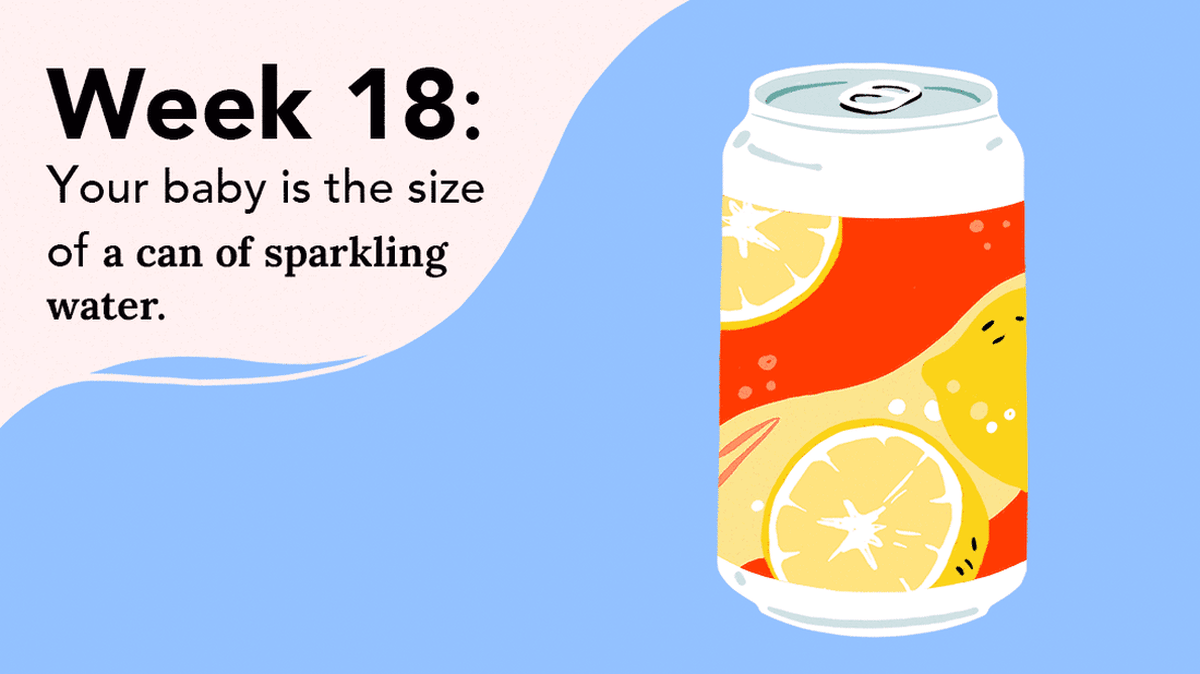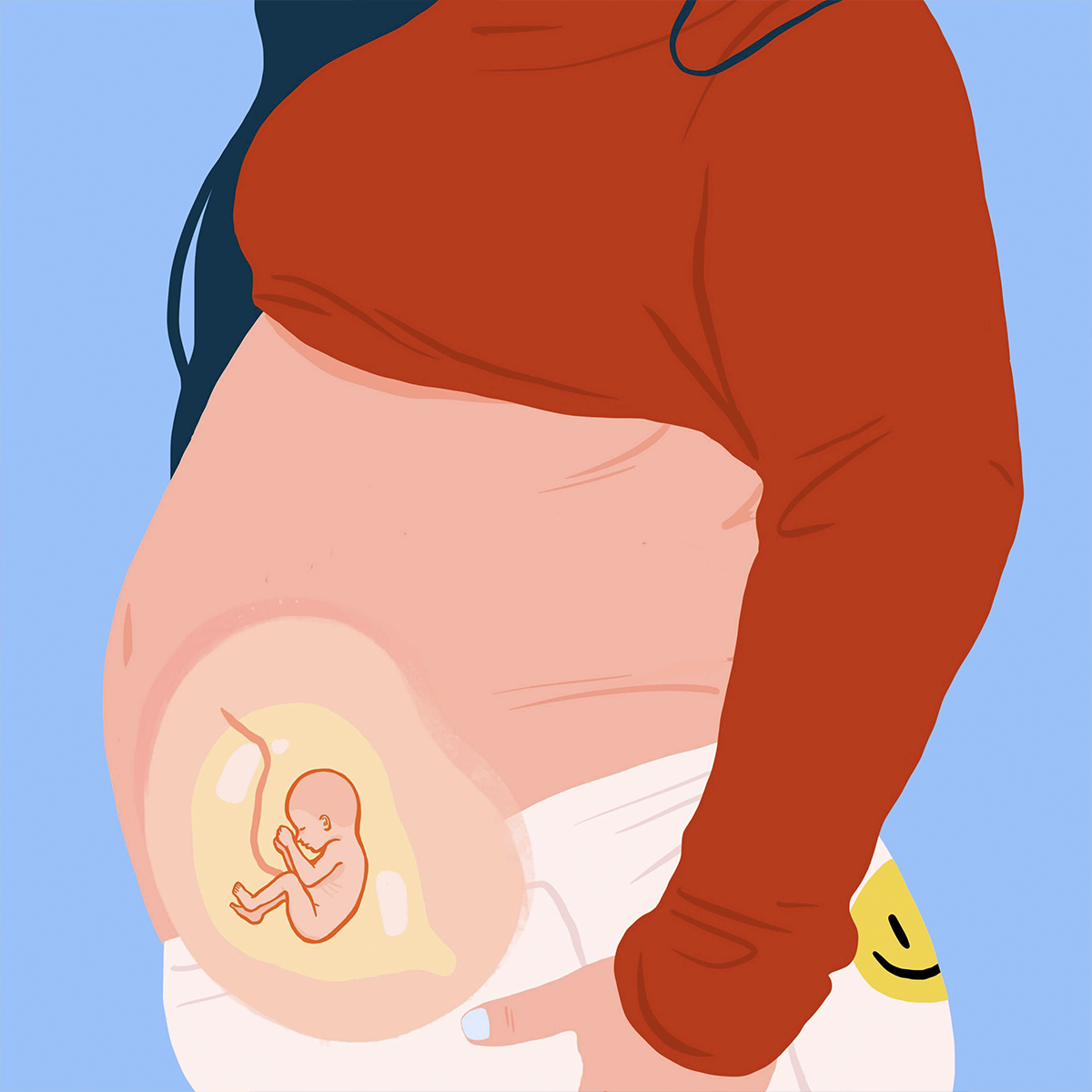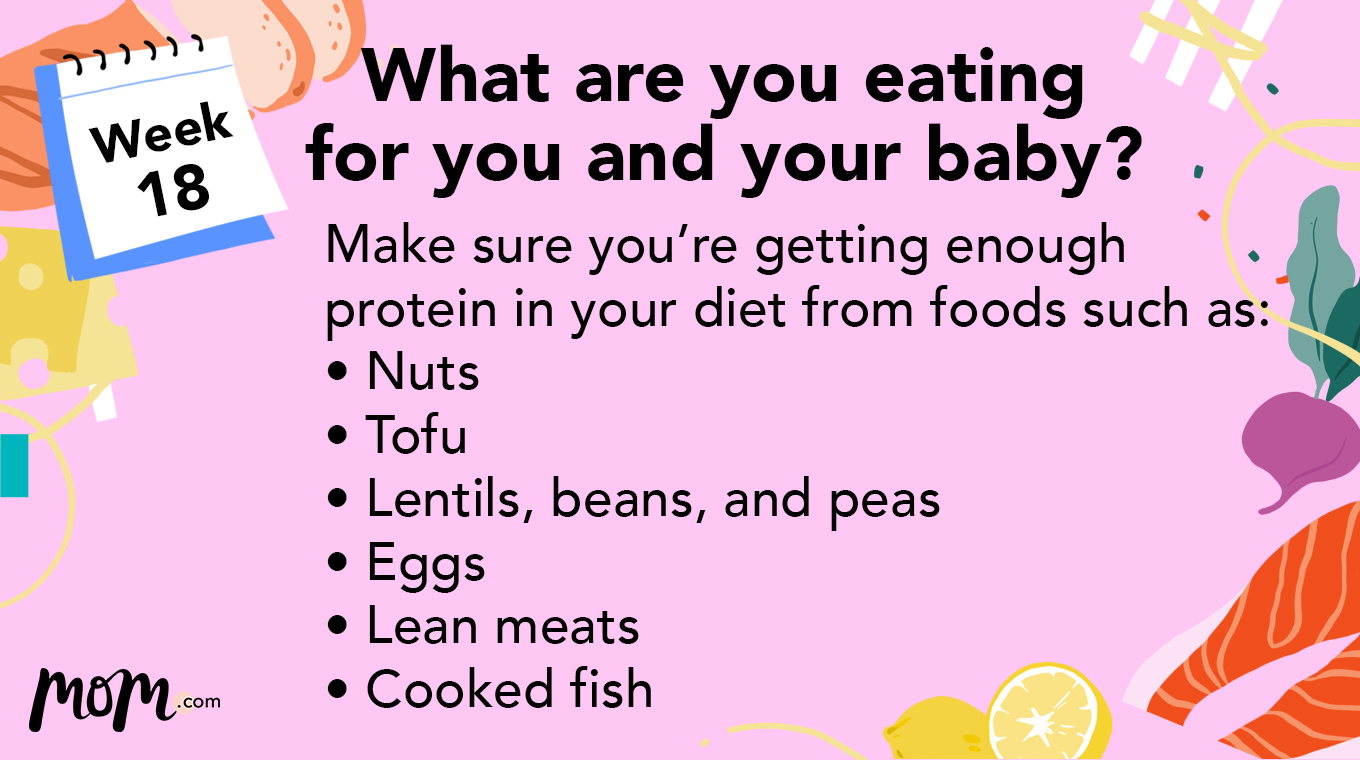
In this article
You’re 18 weeks pregnant!
Pregnancy symptoms at 18 weeks
At 18 weeks pregnant — and for the rest of your pregnancy — you may begin finding it difficult to sleep through the night because of frequent bathroom visits and difficulty getting comfortable. For more shut-eye, Robert S. Rosenberg, D.O., FCCP, and Medical Director of the Sleep Disorders Center of Prescott Valley, Arizona, recommends drinking plenty of fluids during the day, but avoiding excessive fluid intake within 2 hours of bedtime.
He also encourages women to sleep on their left side. “Sleeping on your side relieves pressure on your back, increases blood flow to the placenta and uterus, and by decreasing pressure on your inferior vena cava vein may prevent varicosities and nocturnal cramping,” he advised.
Here are some additional signs of pregnancy at 18 weeks:
Breasts begin to leak colostrum
Your breasts are swelling and increasing in preparation for milk production after birth. As a result, your breasts might begin to leak a yellowish pre-milk fluid called colostrum. In addition to increased blood flow to your breast tissue, your breasts are building up fat, tissue, and milk glands to prepare for breastfeeding.
Increased back pain
As your uterus stretches in size and grows heavier, your center of gravity shifts. It is common to experience mild back pain during the second trimester as you change your posture to accommodate for your newly protruding tummy.
Heartburn and constipation
Heartburn is more frequent as your uterus presses against your gastrointestinal tract.
The pregnancy hormones can also slow down your gastrointestinal tract so when combined with your expanding uterus putting pressure on your bowels, constipation may become an issue. Drink more water, eat more fiber, and try probiotics (as long as your doctor approves).
What does 18 weeks equal in months?
At 18 weeks pregnant, you’re in the first week of your fifth month of pregnancy and second trimester. Here’s what pregnancy weeks equal to in months for the second trimester:
- Month 5: Weeks 18 to 22
- Month 6: Weeks 23 to 27
- Month 7: Weeks 28 to 31
Your ultrasound
At 18 weeks pregnant, you may have a scheduled ultrasound if your doctor follows the American College of Obstetricians and Gynecologists (ACOG) recommendation of getting at least one ultrasound around 18 to 22 weeks. If you need an amniocentesis, those are usually scheduled around 15 to 20 weeks. During an amniocentesis, the OB/GYN will also conduct an ultrasound to check on your baby’s health and development. This allows them to gather data on your fetus’s gestational age, check for certain genetic disorders, and listen to the fetal heartbeat.
Also called sonograms, ultrasounds rely on sound wave technology to create a two-dimensional image of your baby. A routine part of prenatal care for the past few decades, ultrasound/sonography has proven itself to be a useful and low-risk tool in evaluating fetal well-being.
The mid-pregnancy ultrasound (also called a level-two ultrasound or anatomy scan) is typically performed during the second trimester. It examines and measures key bones and organs, as well as amniotic fluid, placenta location, and fetal heart rate. An accurate sonogram can indicate healthy growth or potential developmental problems. Ultrasounds are most often performed between the 18th and 22nd weeks of pregnancy because all your baby’s organs are visible by then.
Your pregnant belly at 18 weeks

At 18 weeks, your baby is typically a little longer than 5.5 inches — around the size of a can of sparkling water — and weighs about 6.7 ounces. Your baby’s skin is now less transparent, but since it will be exposed to many more months of life in the watery womb, a whitish coating called vernix caseosa begins to form on the skin’s surface for added protection. The cheese-like coating is usually shed just before birth.
Other changes and developments in your baby by the end of five months include:
- Fine hair (lanugo) covers your baby’s entire body. It is another form of in utero skin protection. Lanugo hair is shed shortly before and after birth.
- Hair may begin to grow from the scalp.
- Your baby measures about 7 1/2 inches from crown to rump, and weighs approximately 11 ounces.
Pregnancy tips at 18 weeks
At 18 weeks pregnant, you may want to do the following for yourself:
Choose a pediatrician
Have you started looking for your baby’s primary care doctor yet? The relatively quiet stretch of the second trimester is often the perfect time to start this search. “During your fifth month of pregnancy is a good time to choose a healthcare provider for your baby — one way to do this is by talking to your friends and ask them if they are happy with the health care provider,” advised Lizellen La Follette, M.D., OB-GYN at Marin General Hospital in Greenbrae, Calif.
Prepare your older children
If you have older children, you may want to begin preparing them for what they can expect with a brand new baby in the house. While you may already be a pro at babies, your kids might not be, and reading some books about new babies or the feelings your kids might feel (e.g.: jealousy, fear, not special) can help.
Wear breathable underwear
Thanks to all your hormones and increased blood flow, you will also experience increased vaginal discharge and sweating. Your underparts will most likely get very damp and moist. Wear breathable cotton or moisture wicking underwear to stay comfortable and prevent developing yeast infections. You can also use unscented pantiliners.
Your pregnancy checklist at 18 weeks
Once the second trimester begins, you will be at the OB/GYN every four weeks so make sure you schedule those visits ahead of time.
Populate your baby registry
Few things are as cute as baby clothes — but maybe you don’t want a closet full of newborn onesies that your baby will immediately outgrow. Make sure you give your family, friends, and coworkers a list of what you want or need to increase the odds of receiving them!
Ask your experienced friends — or consult the internet — for “must-have” items you’ll need for your new baby. Remember: while cute outfits are definitely social media worthy, you’ll always need diapers. Consider adding multiple sizes so the diapers grow in size along with your little one.
Start planning your maternity leave
Look into your company and state laws regarding maternity leave. How many weeks are you allotted? Do you need to apply for state disability? When can you qualify for the federal Family Medical Leave Act (FMLA)? If you plan on working after your leave, also start looking into childcare. Ask your trusted family and friends in your area what they would recommend in terms of local daycares, nannies, or au pairs.
What are you eating for you and your baby?

Your appetite at 18 weeks pregnant may also pick up steam in your fifth month. For normal-weight women, gaining about one pound per week during the second and third trimesters is considered optimal for baby’s growth and the health of your pregnancy. Doctors recommend approximately 2,200 calories a day to properly nourish you and your baby. If you get full easily, try eating several small meals of nutrient-rich foods like hearty soups, leafy greens, and lean protein.
Folic acid
For healthy fetal central nervous system and brain development, make sure your diet is rich in folic acid, a critical B vitamin. While it’s best to get folate through your food, you can also take supplements. Some foods high in folic acid are:
- Green leafy vegetables
- Broccoli
- Chickpeas or kidney beans
- Brussel sprouts
- Nuts
- Oranges
- Strawberries
Protein
For healthy fetal brain development as well as other fetal tissues, you’ll need lots of protein. You can get protein by eating these foods:
- Nuts
- Tofu
- Eggs
- Lean meats
- Cooked fish
- Lentils, beans, and peas
Calcium
For strong bone development, add calcium by eating calcium rich foods found in dairy products, dark leafy greens like spinach and kale, almonds, and lentils. Eat them with foods high in Vitamin D like salmon, egg yolks, and herring or sardines to help your body better absorb the calcium.
In addition, try to avoid or restrict the following foods:
- Caffeine, alcohol, and drugs
- Undercooked meats
- Unheated lunch meats
- Unpasteurized foods (e.g.: soft cheeses)
- Unwashed fruits and vegetables
- High mercury seafoods
- Raw seafood (e.g.: sushi)
- Raw eggs
When to call your doctor
If you are bleeding, spotting, and experiencing pelvic or abdominal cramping, contact your doctor as soon as possible. Keep in mind that you may also require additional mental and emotional support due to hormones affecting your emotional state. If you currently or have previously suffered from depression, excessive stress, or anxiety, reach out to a professional for help if it gets too much.
According to the Centers for Disease Control and Prevention (CDC), pregnant women are at a higher risk of severe illness from COVID-19 and death compared to non-pregnant people. Furthermore, pregnant women with COVID-19 are at increased risk of delivering a baby before 37 weeks (preterm birth) and other adverse ramifications.
Note: If you are visiting a mental health professional or medical professional during COVID, make sure to ask about the facility’s safety measures and confirm that they are following COVID protocols as indicated by the CDC.
Additional considerations
According to some studies, compared to heterosexual women, bisexual and lesbian women were more likely to have pregnancies result in stillbirth or very preterm birth, and lesbian women were more likely to report infants with low birth weights. While these outcomes have yet to be significantly studied, risks of low birth weight babies, preterm birth, and stillbirth are generally higher among marginalized groups — which includes LGBTQIA+ women and people.
Marginalized groups tend to be at elevated risk for adverse health conditions and disproportionately face barriers to health care services such as heterosexism from health care providers and institutions, lack of support from family and society, as well as additional stressors related to being a minority.






